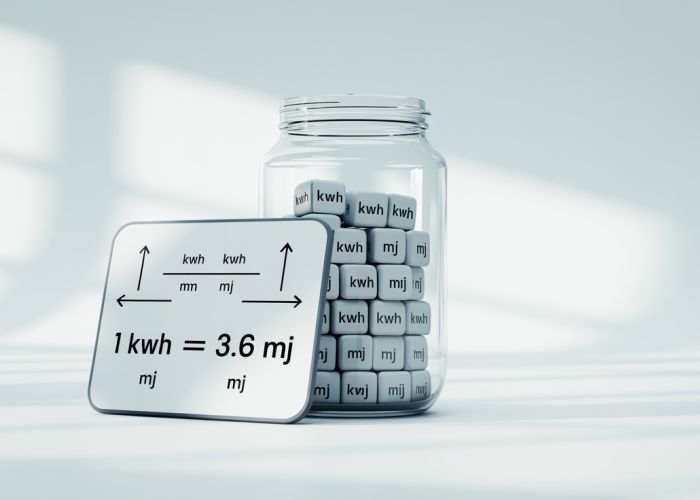Energy conversion is a crucial aspect of modern engineering, especially when dealing with different units. Understanding kwh to megajoules becomes essential for professionals working with tools like the energy calculator and for organizations like the International Energy Agency (IEA) which aims to promote energy efficiency. The principle that energy is conserved drives the process of converting kwh to megajoules, ensuring a proper understanding that helps in managing energy consumption and distribution.

kWh to Megajoules: The Shockingly Easy Conversion!
Understanding energy units can sometimes feel overwhelming, but converting between kilowatt-hours (kWh) and megajoules (MJ) is surprisingly straightforward. This guide breaks down the process, showing you why this conversion is useful and providing easy methods to convert between these units.
Why Convert kWh to Megajoules?
Knowing how to convert kWh to megajoules is useful for several reasons:
- Comparing Energy Consumption: Different industries and contexts often use different units for energy. Being able to convert between them allows for easy comparisons of energy consumption across various sectors.
- Understanding Energy Bills: While your electricity bill is typically in kWh, large-scale energy reports might use megajoules. Converting allows you to contextualize your personal energy usage within a broader energy landscape.
- Scientific and Engineering Applications: Many scientific and engineering calculations require energy to be expressed in Joules (or its multiples like megajoules) for consistency and accurate results.
- Environmental Impact Assessment: Converting allows for easier analysis of environmental impacts using standard energy units for comparison.
The Core Conversion Factor
The key to converting kWh to megajoules is a simple, fixed value:
- 1 kWh = 3.6 MJ
This conversion factor arises from the definitions of these units:
- A kilowatt-hour (kWh) is a unit of energy representing the amount of energy used by a 1-kilowatt appliance running for one hour.
- A megajoule (MJ) is a unit of energy equal to one million joules.
Manual Conversion: The Multiplication Method
Converting from kWh to MJ manually is a matter of simple multiplication.
- Identify the kWh value: Determine the number of kilowatt-hours you wish to convert. For example, let’s say you have 25 kWh.
- Multiply by the conversion factor: Multiply the kWh value by 3.6.
- 25 kWh * 3.6 MJ/kWh = 90 MJ
- Result: Therefore, 25 kWh is equal to 90 MJ.
Using an Example Table for Quick Reference
A pre-calculated table can make the conversion even faster. Here’s a sample:
| kWh | Megajoules (MJ) |
|---|---|
| 1 | 3.6 |
| 5 | 18 |
| 10 | 36 |
| 20 | 72 |
| 50 | 180 |
| 100 | 360 |
Converting from Megajoules Back to kWh
The conversion also works in reverse. If you know the energy in megajoules and want to find the equivalent in kWh, you simply divide by the conversion factor.
- Identify the MJ value: Let’s say you want to convert 54 MJ to kWh.
- Divide by the conversion factor: Divide the MJ value by 3.6.
- 54 MJ / 3.6 MJ/kWh = 15 kWh
- Result: Therefore, 54 MJ is equal to 15 kWh.
Frequently Asked Questions: kWh to Megajoules Conversion
Got questions about converting kWh to megajoules? We’ve got answers! This FAQ addresses some common queries to help you understand this surprisingly simple conversion.
Why would I need to convert kWh to megajoules?
While kilowatt-hours (kWh) are common for measuring electricity consumption, megajoules (MJ) are sometimes used in scientific or engineering contexts, and sometimes in broader energy reports. Converting from kwh to megajoules allows for easier comparison and calculation across different energy units.
What exactly is a megajoule?
A megajoule (MJ) is a unit of energy in the metric system. Specifically, it’s one million joules. Joules are the standard unit of energy, so a megajoule represents a substantial amount of energy.
What’s the magic number for converting kWh to megajoules?
The conversion factor is 3.6. That means 1 kWh is equal to 3.6 MJ. So, to convert kwh to megajoules, you simply multiply the kWh value by 3.6.
Can I convert megajoules back to kWh?
Yes, you can. To convert from megajoules to kWh, you divide the megajoule value by 3.6. This is the inverse of the kWh to megajoules conversion.
So, there you have it! Converting kwh to megajoules is easier than you thought, right? Now you can confidently tackle any energy calculation that comes your way!